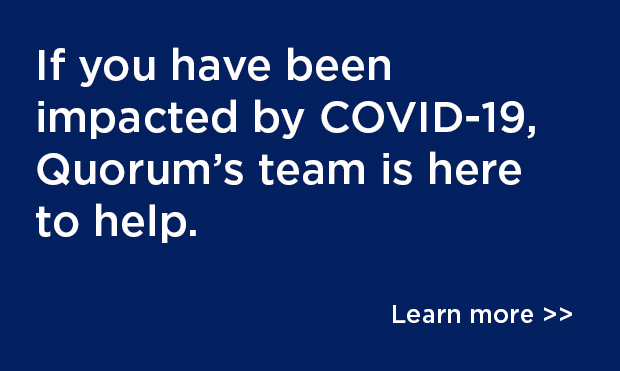If you’ve lost your job or seen your income cut drastically in the past couple of months, you’re likely looking for sources of much-needed money to pay your bills. For the first time ever, you may be considering dipping into your retirement savings.
Why Now May Seem Like a Better Time Than Ever
The Coronavirus Aid, Relief and Economic Security Act (CARES) Act, signed into law in late March, includes provisions that make it easier and less costly for those who qualify for a Coronavirus-Related Distribution (CRD), to access money from a retirement account or employer-sponsored plan.
To be eligible for a CRD, a person must have been diagnosed with the virus, have a spouse or dependent diagnosed with it, and/or have suffered financial consequences due to the virus. These financial consequences include a layoff, work hours reduction, business closure, or inability to work because no child care is available.
Here are some of the highlighted CRD provisions:
- It waives the usual 10% penalty for early distributions (withdrawals) from traditional IRAs and employer-sponsored plans like 401(k)s for people under 59 ½ years old. (Roth IRAs are not subject to that 10% early withdrawal penalty.) It’s important to note that early withdrawals will still be taxed at the taxpayer’s current rate, even though there is no penalty.
- It doubles the maximum amount that people can borrow from employer-sponsored plans to $100,000 or the total vested amount in the account (whichever is lower). (Note that the CARES Act provisions regarding employer-sponsored plans are subject to the rules of individual plans. Most, but not all, allow loans and hardship withdrawals. Check with your employer or plan administrator to find out what your plan allows).
Being able to access a significant amount of your retirement savings without a penalty may seem like a good solution. However, financial experts caution that using your retirement savings—even with the relief provided by the CARES Act—should be a last resort. Let’s take a look at some potential downsides to consider before using your retirement savings to help make ends meet:
You Will Have to Pay Income Tax on Any Money You Withdraw and Don’t Repay.
As noted above, if you withdraw money from a retirement plan as a CRD, you will have to report it on your income taxes. However, you don’t have to report it all for Tax Year 2020. You have up to three years to report the entire amount (or any amount that you don’t put back in your account within that time).
However, what if you withdraw a significant amount and don’t pay it back? No matter how you choose to split the reporting over the next three tax years, you could wind up in a higher tax bracket in at least one of those years. (Consult your tax advisor.)
You’re Withdrawing Money at a Time When the Stock Market Has Been in a Historic Slide.
If your retirement accounts include investments that are tied to the stock market, they are probably doing worse than they were even six months ago. If you withdraw now, you’re doing the opposite of the old “buy low, sell high” adage. Typically, when markets recover after a significant downturn, they do so quickly. By the time you’re ready to repay the amount you withdrew, your money may buy you a lot less in investments. If the markets do start to rebound, you’ll miss out on that recovery if you haven’t already recontributed the money.
You May Never Be Able to Build up Your Retirement Savings Again.
Your retirement savings may be the only tax-deferred savings you have. You’ve probably added to it over many years to build your retirement nest egg. If you have an employer-sponsored plan, you’ve benefitted from matching contributions that have helped it grow. Any amount you take out is no longer benefitting from tax-deferred growth. If most of your earning years are behind you, that could be a big chunk of money you’ve been counting on for a comfortable retirement that won’t be there.
You Could Have to Pay off a Loan on Your 401(k) Sooner Than You Think.
If your employer-sponsored 401(l) plan allows you to borrow from it, perhaps you’ve considered this as an option for needed money. Under Section 2103 of the CARES Act, if you obtain one of these loans between March 27 and Dec. 31, 2020 as a CRD, you have six years to repay it rather than the usual five years. If you have an existing loan where repayment is due within that period, you can defer that repayment for up to an additional year.
However, consider what would happen if you lost your job, or the business you work for doesn’t survive. How soon will you have to pay back the entire loan (plus interest)? Under the tax laws, you have until tax day of the following year to repay the loan or place the money owed in another qualifying retirement account, If you don’t, it will be taxed like a withdrawal (along with the 10% penalty). However, your plan may require you to repay the loan sooner. If you’re in this situation, it’s important to check with your employer or plan administrator.
Other Options for Obtaining Money
Rather than using your retirement savings for needed money, or borrowing from your employer-sponsored plan, be sure to compare it to the terms of other loan options, such as possibly refinancing your mortgage. You may want to consider a home equity line of credit or home equity loan if you have equity in your home.
Another possibility is obtaining a credit card cash advance. Just be sure you know what it will cost you, now and in the future. Read the fine print in your credit card agreement. In addition to the cash advance fee, find out what the annual percentage rate (APR) is. The APR is often higher for cash advances than it is for regular credit card balances. Interest will start accruing on your cash advance as soon as you get it.
Don’t forget to find out what government and private assistance options are available. The federal government offers a number of programs that provide assistance with necessary living expenses like housing, food and health care. USA.gov is a good resource. So is needhelppayingbills.com, which provides links to help you connect with state programs.
Many cities and counties are offering assistance programs. Nonprofit organizations may be able to help as well. Check on programs for people in your line of work. Your alma mater may even be offering assistance for alumni.
Everyone’s situation is unique. Perhaps withdrawing or borrowing on a portion of your retirement savings is your best option. However, don’t take that step without understanding how it will impact you in the future, and without first exploring all of your options.






Comments Section
Please note: Comments are not monitored for member servicing inquiries and will not be published. If you have a question or comment about a Quorum product or account, please visit quorumfcu.org to submit a query with our Member Service Team. Thank you.